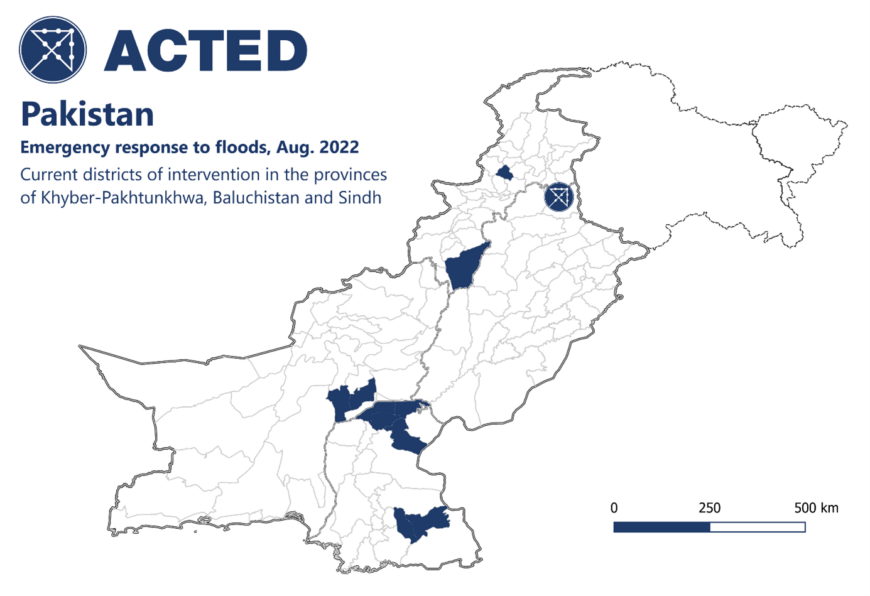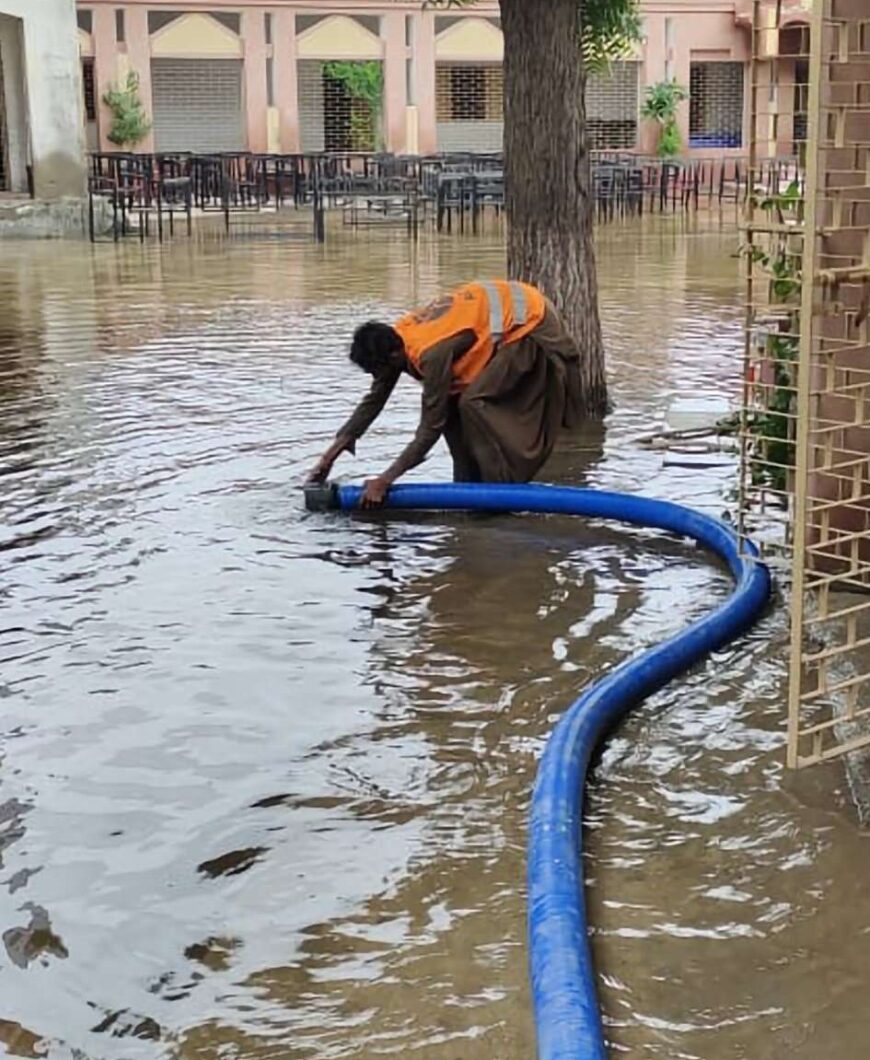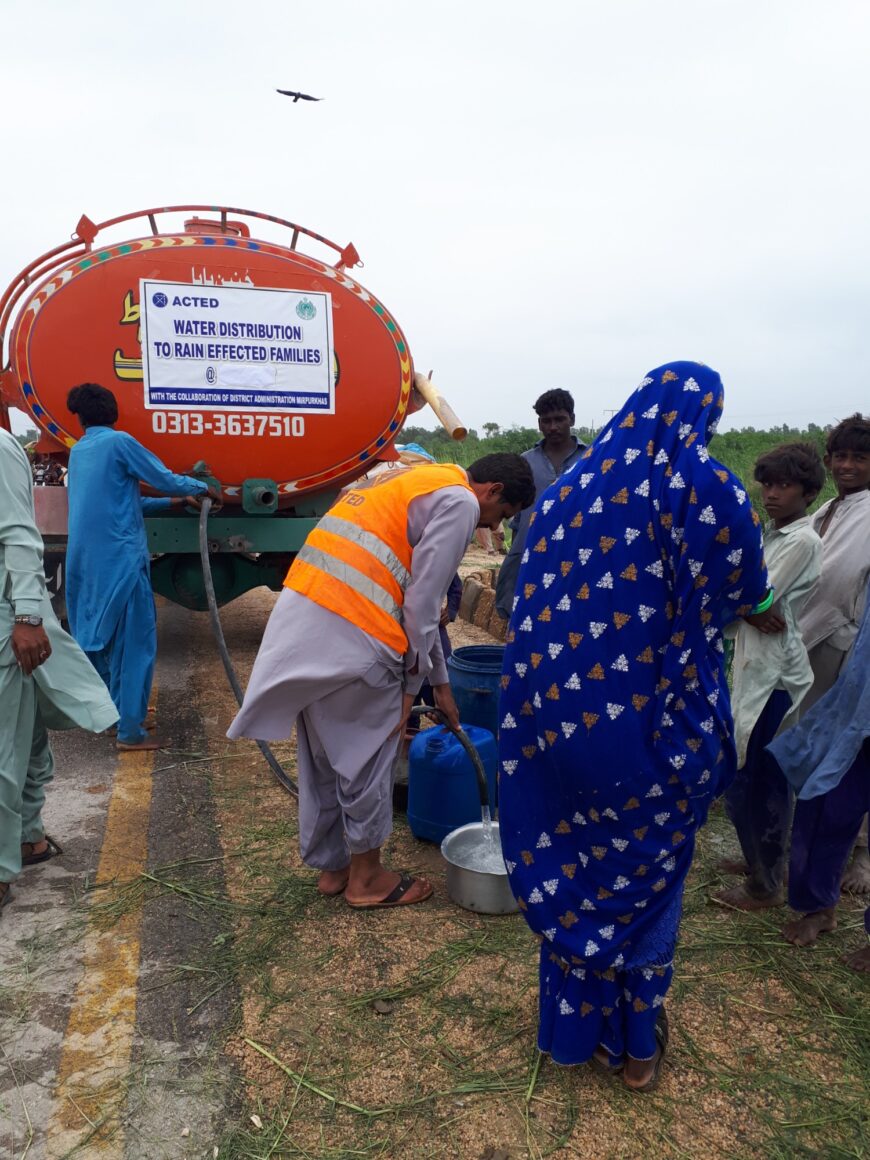ACTED has been present in Pakistan since 2005, in particular in the three provinces of Khyber-Pakhtunkhwa, Gilgit-Baltistan and Sindh, where the organisation responded to the earthquake of 2005 and later to major floods of 2010 and 2011. Since 2020 ACTED has directed most of its humanitarian assistance to Khyber-Pakhtunkhwa (KP), Sindh and Baluchistan, in support of the GoP-led interventions and in close coordination with other humanitarian actors in country.
Summary
Following the severe floods that have affected most districts of Pakistan since July 2022, ACTED has launched a large-scale emergency intervention to support and complement the Government-led response. By scaling up its operations, ACTED aims to provide life-saving assistance to at least flood-affected families (245,000 individuals), and reduce the short- to medium-term impact of the disaster to support the recovery of affected communities.
During the emergency phase of its response, prioritising cash over the in-kind assistance wherever possible, ACTED to families who have lost their homes in around 10 districts within the provinces of Baluchistan, Sindh and KP, and make sure that displaced populations have access to safe drinking water and sanitation facilities. In addition, ACTED will contribute to reducing the effects of the disaster on the already poor food security situation in these districts, through food assistance and livelihoods support to the most vulnerable population, in particular the elderly, households headed by women or comprising persons with special needs (e.g., pregnant and lactating women, persons with disabilities, children under five).
ACTED’s emergency response plan to the floods in Pakistan plans to assist an initial caseload of 245,000 individuals for total budget of 11.4 million USD.

Context and Humanitarian Needs Overview
Since the mid of June 2022, the monsoon season in Pakistan has seen significantly higher-than-average rainfall, equivalent to nearly three times the country’s 30-year average. As of 1 September, 80 out of the country’s 130 districts have been declared ‘calamity hit’ by the authorities, with an expectation that this number will remain on the increase. These are mostly in the provinces of:
- Baluchistan, which has received more than five times its 30-year average rainfall, and where 31 districts have been declared ‘calamity hit’. The heavy spell of rains of the last few months have resulted in flash floods, destroying houses and public infrastructure, livestock and crops. This is, according to the National Disaster Management Authority, a distinct change in the monsoon pattern, as the province was not or barely affected previously.
- Sindh, which has received nearly six times its 30-year average rainfall, and where 23 districts have been declared ‘calamity hit’. Almost all urban and rural areas of the provinces have bene flooded with sewage-mixed rainwater, while floods have washed away the standing crops claimed a high number of livestock.
- Khyber-Pakhtunkhwa (KP), where 17 districts have been declared ‘calamity hit’. Local disaster management authorities are on high alert as very high level of flooding are expected in River Kabul and Indus.

Out of the 33 million people reported by the Government of Pakistan (GoP) as being affected across the country, these three provinces only total a population of over 18 million including an estimated 85,500 people living in camps as a result of the floods and subsequent destructions.
The floods caused by these heavy rains have resulted in an estimated 1,208 casualties, as well as significant destruction of infrastructure. The National Disaster Management Authority reported nearly 450,000 private houses fully destroyed and nearly 750,000 damaged, mostly in Sindh province. Public infrastructure has also been severely hit, including roads (with most of the nearly 5,000km of damaged roads in KP, Sindh and Baluchistan) and bridges, which has restricted local populations’ capacity to seek refuge in safer areas and impeded responders’ capacity to deliver assistance. Health facilities and schools have also been affected, including many being occupied by families as 3m people are reported displaced.
Local livelihoods have also been severely affected. Nearly 2m acres of crops and orchards have been destroyed, most of which in Sindh and a large number in Baluchistan. In addition, an estimated 730,000 heads of livestock have reportedly died (predominantly in Baluchistan). This is expected to have a short- to medium-term impact on food availability and prices, and therefore food security.
ACTED’s Objectives
In support to the GoP-led response ACTED’s ongoing emergency response in the provinces of Balochitan, Sindh and KP has the twofold objective of:
- Providing urgent, lifesaving assistance, and ensure local flood-affected populations have access to the needed support in safe and dignified conditions.
- Reducing the short- to medium-term impact of the flood and consequent destruction to support the recovery of affected populations, including with regards to livelihood and education.
These objectives not only cover ACTED’s immediate and ongoing interventions (emergency phase), but also anticipate on the need to minimise short- to medium-term impacts of the floods and consequent destruction by supporting the recovery of affected populations (recovery interventions).
In total, ACTED’s response aims to provide assistance to , through the commitment of c. 11,4 million USD.
Humanitarian Needs Overview and ACTED’s Response
In its 2022 Floods Response Plan, OCHA reports that an estimated 6.4m people are in need of assistance (as of 27 August). The humanitarian situation is expected to continue deteriorating with ongoing rainfall.
Access remains an issue: provisional figures from the NDMA indicate that over 5,000km of roads have been destroyed, including 2,300km in Sindh, 1,600 in KP and 1,000 in Baluchistan.
Shelter and NFIs
Out of the nearly 1,200,000 fully or partially destroyed houses reported by NDMA, provisional figures estimate that almost 1,000,000 are in Sindh province (616,000 damaged and 370,000 fully destroyed, making Sindh the province that has reported the most damaged to his housing stock across the country), and over 750,000 in KP (450,000 damaged and 320,000 fully destroyed). For the affected families, damage to homes is compounded by the depreciating value of related assets and the loss of household items: ACTED’s rapid needs assessment indicates that 30% of those families who have lost their houses have also lost all their essential household items. Therefore, these families require direct support for temporary accommodation and essential NFIs, as well as assistance for debris removal, and repair & reconstruction. Key informant interviews conducted by ACTED indicates that many households (many with children and elderly family members) had no resort but to live in the open air, which raises important protection concerns (especially for women and girls).
Emergency Response
ACTED has been providing affected households with temporary emergency shelter material (e.g. tarp) and aim to scale up its Shelter and NFI response to provide in-kind supplies (e.g. shelter kits including bamboos, ropes, tarp, etc.; and NFI kits including blankets, solar lights, kitchen sets, etc.) and/or cash assistance (e.g. multi-purpose or cash-for-rent) to nearly 50,000 flood-affected families. Families will be prioritised based on the severity of their needs, including those who completely lost their homes and those whose homes have suffered greater damage, with specific focus being placed on households with compounding vulnerabilities such as those including elderly members or persons with disabilities, or headed by women.
Recovery intervention
To support affected households in restoring safe and dignified living conditions, To support the transition to recovery, ACTED will also implement the organisation will also make resources and capacity available to support local authorities in the structural assessment of buildings in its areas of intervention.

WASH
Access to sufficient and quality drinking water is a primary issue following the floodings. Data from ACTED’s rapid needs assessment in Sindh, Baluchistan and KP, as well as from the UN-led joint assessment to which ACTED contributed, show that 63% of the population reported this as a serious issue, while quality concerns such as turbid and smelly water were described. In the districts assessed by ACTED’s teams, the primary sources of drinking water include hand pumps, boreholes, open walls and surface water, with significant concerns about their contamination because of stagnant flood and seepage water. In addition, as is often the case following natural disaster of this scale, significant concerns are arising regarding sanitation and hygiene practices, with reports that many have had no choice but to resort to open defecation. In addition to concerns for protection and the dignity of affected people, this poses further risks of contamination and spreading of diseases. Women, girls and persons with disabilities are reported as facing greater difficulties and risks accessing the latrines set up in informal evacuation centres (temporary shelters established in public buildings or school buildings, etc.). In addition, displaced women and girls lack adequate facilities to manage their menstrual hygiene in a safe and dignified manner.
Emergency Response
Focusing on priority needs in the WASH sector, ACTED will provide safe drinking water to affected communities. In the emergency phase, this will primarily be done through water tankering In addition, ACTED will provide adequate, gender-separated sanitation facilities for those displaced, along with the necessary NFIs to encourage good hygiene practices (e.g. closed water containers, soap). These distributions will be accompanied by hygiene promotion activities, as ACTED’s rapid needs assessment indicates that few community members are aware of the links between consumption of contaminated water and diseases such as polio, malaria and dengue fever.
Recovery interventions
Once water levels have lowered and displaced populations are able to return to their places of origin, ACTED’s teams will pursue its effort toward vector control and hygiene promotion. They will also support the rehabilitation and disinfection of water sources (e.g. hand pumps, dug wells) and village cleaning campaigns.
Food Security and Agriculture
Pakistan was already subject to major socioeconomic vulnerabilities, with millions estimated to be food insecure in the districts declared ‘calamity hit’. The impacts of the heavy rainfalls and consequent disasters (e.g. floods, landslides) have been particularly severe on agricultural land and livestock especially in Sindh and Baluchistan where food insecurity was already high. Compounded by damages to transport infrastructure, this has meant in the immediate term a reduction in food access in the affected areas, even if markets remain fully or partially open, and an increase in prices. Communities assessed by ACTED’s teams in districts of Sindh and Baluchistan report no access to food in their locations, and in some cases no access to the local markets at all. According to key informants, all affected districts are therefore in need of food assistance.
Emergency response
ACTED will support and complement the GoP’s emergency response, prioritising wherever possible distributions of multi-purpose cash assistance.
Recovery interventions
Multi-purpose cash assistance will also enable the early restoration of livelihoods activities of affected populations, which will be complemented by incentives to diversify livelihood activities (e.g. training on income-generating activities). ACTED will also aim to provide inputs to affected families whose livelihoods depend primarily on agriculture, including seeds and fertilisers. In addition, cash-for-work will be considered for the clearing and rehabilitation of communal agricultural infrastructure such as irrigation channels.
Education
The education sector has been severely affected by the rainfall, flooding and ensuing destruction. In addition, many schools in the targeted provinces have been used as temporary shelter by displaced families seeking safety. In Sindh province only, the Education Department estimates that over 15,500 schools were damaged or destroyed.
Needs in the sector include the establishment of temporary learning centres (TLCs) and the provision of learning materials; dewatering and cleaning of facilities; technical support to teaching staff on psychosocial support (PSS) and Education in Emergency (EiE).
Emergency response
ACTED will seek to use resources and expertise from its current education programming in Pakistan to contribute to the EiE response. Activities will be implemented in parallel with WASH and shelter interventions in particular to ensure that the affected families who had sought shelter in school have adequate alternatives.
Recovery interventions
To support the recovery of affected communities in the targeted districts, ACTED will aim at ensuring education facilities are cleared and cleaned, re-equipped with the necessary learning material, and that staff is supported (including through adequate training) in resuming school activities while considering the difficulties (material and psychological) students may have faced during the previous weeks and months due to the floods. In addition, ACTED will seek to incentivise families to send their children back to school when those reopen, in particular girls who are at higher risk of early dropout. This will be done in parallel to livelihoods activities so that those families who have lost assets and income in the floods are not compelled to cut their children’s education short in order to limit the financial burden on their household.
Protection
Protection concerns are significant in the targeted provinces of Baluchistan, Sindh and KP, even more so after the natural disasters left many families with women, children, elderly and/or disabled members living in the open or in temporary shelters. For instance, ACTED’s team have noted that there were no specific arrangements for the transportation of persons with special needs (e.g. persons with disabilities, pregnant and lactating women, the elderly and children) to safe areas in the provinces of Sindh and Baluchistan. In response, ACTED has placed the protection of vulnerable affected people at the core of its emergency and recovery interventions, for instance by ensuring women, children, people with disabilities and the elderly who have lost their homes have access to safe spaces and sanitation facilities, specific non-food items (e.g. dignity kits) and information on available child protection and other protection services, and assistance for those at risk of gender-based violence.
Coordination
ACTED places strong emphasis on coordination with local authorities and emergency responders, including other humanitarian actors involved in the same or related sectors of intervention, so as to avoid overlap and maximise coverage, foster complementarity and facilitate learning.
ACTED is in regular liaison with the Provincial Disaster Management Authority, district authorities and Tehsil municipal administration, as well as in close communication with local and national government bodies to share information on planned assessments and activities, thereby optimizing coordination and ensuring access to target areas.
ACTED is an active member of the Pakistan Humanitarian Forum at both national and provincial levels, including its Food Security and Livelihood Working Group. The organisation also participates in the Cash and Markets Working Group that contributes to coordinating cash transfer activities across the country, and in the WASH cluster. Through these platforms, ACTED has contributed to the definition of best and contextually relevant practices and lessons learnt, with a specific focus on emergency assistance and recovery, as well as the prioritisation of severely affected areas during natural and man-made disasters.